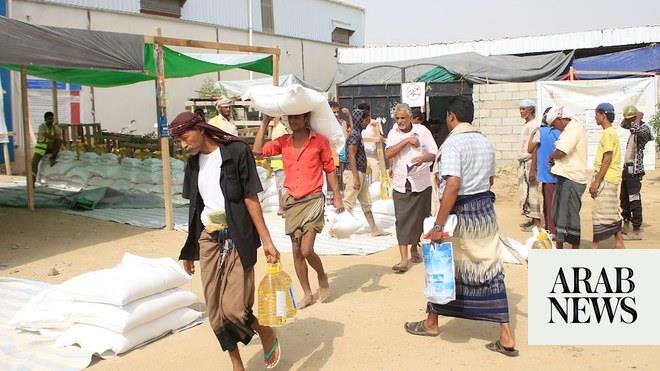
Saudi Arabia announced the provision of new economic support, amounting to $1.2 billion, to Yemen. This is in line with the directives of Custodian of the Two Holy Mosques King Salman and Crown Prince and Prime Minister Mohammed bin Salman in response to a request from the Yemeni government to assist it in addressing its budget deficit, and in support of the Presidential Leadership Council.
This support is also meant to offset the Yemeni government’s budget deficit, support for salaries, wages, and meeting operating expenses and for guaranteeing Yemen’s food security. It is in addition to what the Kingdom has previously offered in terms of economic and development assistance.
It is also in continuation of the agreement reached between the two governments that made possible through the Saudi Development and Reconstruction Program for Yemen (SDRPY). It is part of the Saudi government"s role to aid the Yemeni people, as well as to alleviate their suffering, and bolster the economy to enable the Yemeni government to fulfil its other obligations, the Saudi Press Agency reported.
This generous support comes as a confirmation of the Kingdom’s keenness to achieve security, stability and development for the Yemeni people and as a contribution to strengthening the budget of the Yemeni government, improving the Yemeni economy, and raising the purchasing power of the Yemeni citizen, which will improve the infrastructure, support the essential sectors, and improve the daily life of the Yemeni people.
This support also comes as an effort exerted by the Kingdom to support Yemen in various fields, as the Kingdom provided deposits in the Central Bank of Yemen as part of the Kingdom’s support for the Yemeni people, bringing the total amount provided to the Central Bank of Yemen to $4 billion during the period from 2012 to 2022.
The deposits come to improve the daily life of the Yemeni people, as the Kingdom provided $1 billion in 2012 and provided $2 billion in 2018 in the account of the Central Bank of Yemen as a deposit designated to cover the import of basic food commodities such as wheat grains, wheat flour, rice, milk, cooking oil, and sugar, which contributed to improving the human development index, strengthening the Central Bank’s reserves of foreign currencies, a relative reduction of the currency collapse, decreasing in fuel and diesel prices, in addition to improving the standard of living and increasing the growth of the gross domestic product during 2019.
The previous Saudi deposit reduced fuel and diesel prices by about 36 percent in 2019, and the average cost of the lowest food basket decreased by about 16 percent in 2018. It maintained its stability until the end of 2019, as well as a decrease in the prices of imported food commodities by about 19 percent after it reached its peak in October 2018.
The real GDP growth rate during 2018 and 2019 saw a rise of about 0.75 percent in 2018 and 1.4 percent in 2019, according to 2022 estimates by the International Monetary Fund. It also contributed to the rise in foreign currency reserves in the Central Bank of Yemen from $900 million in 2017 to $ 2.5 billion in 2018, the increase in total food imports in 2019 by 17 percent compared to 2018, and the decrease in exchange rates in 2018 by 25 percent. In 2019, the Central Bank of Yemen stabilized the Yemeni riyal exchange rate by about 500 riyals/USD.
Saudi Arabia’s integrated support has contributed to a part of economic efficiency and enhancement of the financial and economic situations in Yemen, mainly the exchange rate of the Yemeni riyal, which reflected positively on the living conditions of Yemeni citizens with stable prices of food commodities, reduced deterioration of purchasing power, reduced inflation and increased expenditure rates, which contributed to the improvement of the Yemeni economy between the fourth quarter of 2018 and the end of 2019.
The Kingdom has played an important role in stimulating economic growth in Yemen by providing grants of fuel derivatives, which are intended to generate electricity for all Yemeni governorates. These grants from Saudi Arabia aimed at stimulating Yemen’s economy and increasing the efficiency of vital, productive and service sectors. In 2021-2022, the total support for oil derivatives was about 1,260,850 metric tons for operating more than 70 Yemeni stations, with a value of $422 million, distributed in various Yemeni governorates.
The total quantities of fuel supplied to the oil derivatives grant included 511,684,41 metric tons of diesel and 257,955,86 metric tons of mazut, which contributed to alleviating the burden on the Yemeni government’s budget, reducing the Central Bank of Yemen"s use of foreign currency reserves for the purchase of oil derivatives to generate electricity from global markets by reducing fuel sale prices from global electricity generation prices by 79 percent for diesel, 94 percent of the mazut by 3,898,608 barrels of diesel and 1,928,887 barrels of mazut.
The total quantities of energy produced amounted to 2,828 GWh, which contributed to an increase in the operation of average electricity hours in several governorates, where the rate went up by around 20 percent in Aden, which would increase trade traffic by increasing working hours in shops and markets.
It also contributed to the creation of approximately 16,000 new job opportunities and the stimulation of logistical movement in transport services through the movement of ships, as the number of ships for internal transport reached 21 while the number of tankers reached 9,928 tankers. It also increased the number of electricity subscribers by approximately 9,377 subscribers, and the number of grant beneficiaries reached 9,837.
Saudi Arabia directly assisted Yemen as part of a development assistance package granted by the Gulf Cooperation Council (GCC) states to sustain and boost economic growth from 2012 to 2014. During the years 2019 and 2022, the Kingdom’s economic and development support and reform package contributed to improving the financial situation, including the Saudi oil derivatives grant, which contributed to reducing expenses and the burden on the government budget, resulting in a reduction of the deficit rate from -38 percent to -23 percent, in addition to deposits provided to the Central Bank of Yemen, which contributed to supporting the economy.
The Kingdom, through the Saudi Program for the Development and Reconstruction of Yemen, has provided 229 development projects and initiatives since 2018 in 14 Yemeni governorates in seven sectors, namely: education, health, energy, transport, water, agriculture, fisheries and government institutions, in addition to development programs, which contributed to improving infrastructure, essential services and job creation.









